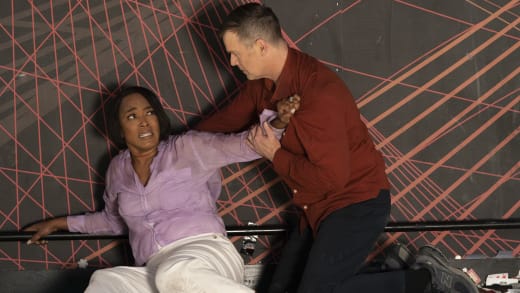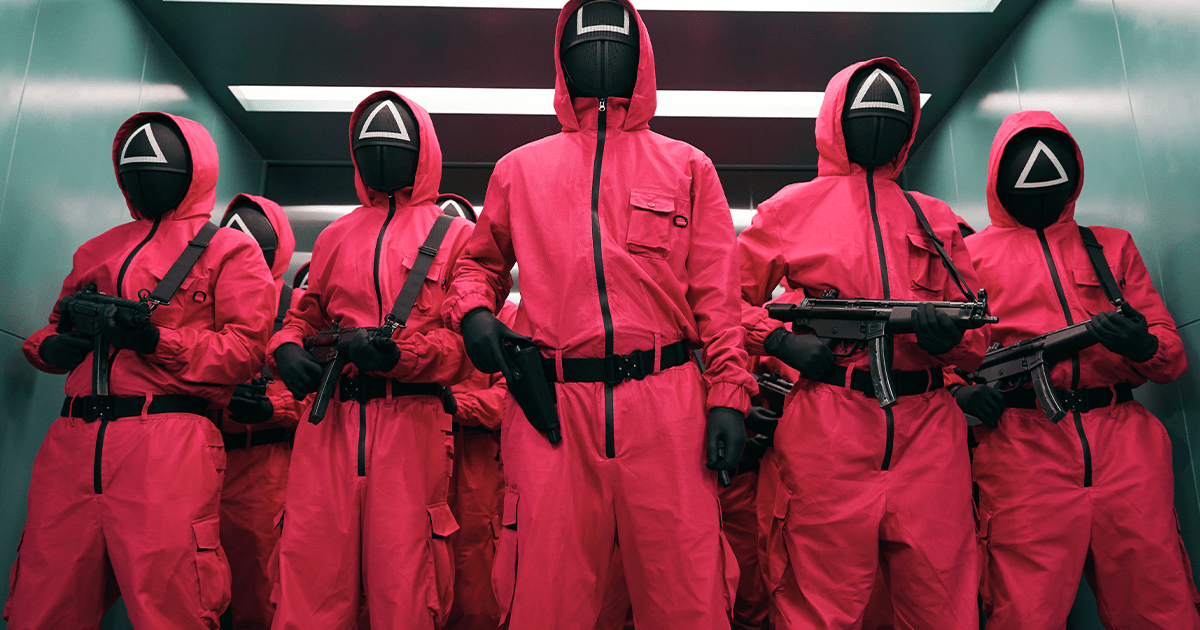“I don’t want to end up being a nothin’.”
American Movie premiered 25 years ago. I saw it for the first time when it played my college campus. Back then it almost felt a mockumentary, except its subjects were real people. I still remember the sound of the laughter erupting in the theater when American Movie’s subject, independent filmmaker Mark Borchardt, tried and failed to shove one of his actors’ heads through a cabinet door during the shooting of an ill-advised stunt for his horror movie, Coven. Mark calls action and then Bang! throws his poor star into the cabinet door. The door doesn’t budge. Bang! Strike two. Bang! Nothing.
25 years later, American Movie hits differently. Today Mark Borchardt looks less like an amusing hustler, and more like a poetic and even tragic hero; the living embodiment of unfulfilled dreams. Even that scene with the unforgiving cabinet door takes on a deeper meaning. It’s still funny, but it also summarizes the lives of dreamers like Mark in a single image. The pursuit of something bigger than yourself so often feels like banging your head against the wall. And when you bang your head against a wall, the wall always wins.
READ MORE: The Greatest Films of All Time
American Movie is full of scenes like that, ones that are hysterical while underscoring the ideas swirling through the film. Here is another example: In one of the most memorable sequences, Mark and his best buddy Mike Schank pay a visit to Mark’s feeble old Uncle Bill, who has given a small chunk of his inexplicably large nest egg to Mark to help finish Coven. Uncle Bill also plays a small role in Coven, but like so many aspects of its production, his big scene went wry; the sound got messed up.
So Mark and Mike try to re-record Uncle Bill’s one line of dialogue with a boom mic. American Movie director Chris Smith observes the disastrous ADR session with a bemused comedic rhythm. As Bill flubs his words over and over, a series of quick cut turn Take One into Take 31, at which point Uncle Bill throws up his hands and gives up.
“Okay, I’m gonna see what we have to work with. I’m gonna … Jesus Christ, man,” Mark groans.
The whole sequence is hilarious — so hilarious it wasn’t until this viewing that it struck me that the line Uncle Bill can’t successfully deliver (“It’s all right! It’s okay! There’s something to live for! Jesus told me so!”) resonates with American Movie’s central theme: That the desire to create is what gives the drudgery of everyday life its meaning.
That doesn’t mean creating is easy, though, especially not in the late 1990s when Mark Borchardt was trying to turn his filmmaking dreams into reality. No doubt fueled by the grassroots success stories of directors like Richard Linklater and Kevin Smith during that era, Borchardt recruited all of his friends and family to help him finance and staff his art — first a semiautobiographical drama called Northwestern, and then, when it became clear he had neither the funds nor the skills to complete Northwestern yet, the cheaper and more marketable Coven. Mark just needs to sell 3,000 VHS tapes of Coven (at $14.95 per VHS copy, he reminds us over and over) to pay off his bills and fund his next project.
American Movie shows how it’s not always enough to be smart or passionate; luck and timing are just as important. If Mark were an ambitious young filmmaker today, he could shoot his little independent movies on his iPhone and put them in front of a potential audience of millions on YouTube.
25 years ago, he’s held hostage by the technology of the time. American Movie watches as edits on flatbeds, records wilderness sounds on a portable Nagra, and generally has to reshoot everything he does at least once because the unforgiving nature of celluloid meant you couldn’t check the quality of your work until you got your developed film back from the lab. Filmmaking is painstaking work at the best of times. And 1990s Menomonee Falls, Wisconsin was not the best times, especially if you wanted to be the next big indie filmmaker.
Mark Borchardt may not have become a legendary American director, but he was an incredible subject for a documentary, one who is equally honest about his insecurities as his desires. He openly admits that one of the things holding him back from finishing Northwestern is fear. “If you actually go ahead and do it, and complete it, there’s more consequences to it,” Mark tells Smith while they watch some abandoned Northwestern dailies.
“You let a day go by and fantasize, and then that day slips into years, and all of a sudden you’re sitting in this living room watching something for six years go.”
“And that shot does look good,” Mark quickly adds.
But it’s not just Mark who makes American Movie a great movie; all of its characters are shockingly candid. Mark’s mother says she doubts he’ll ever be successful. His brother says he always thought Mark would turn out to be a serial killer. Uncle Bill claims he no longer has any dreams of his own, but he isn’t shy about asking for peppermint schnapps when the mood strikes him. (In another telling moment, Mark asks Bill “What are you going to do, sit around outside of a trailer? We’ll film you sitting outside of a trailer, man, but we ain’t gonna live sitting outside of a trailer!”)
And then there’s the great Mike Schank, Mark’s best friend and most loyal production assistant. A life of heavy partying left Mike with an onscreen demeanor and sense of comic timing unlike any you’ll find in another movie. Mike’s burnout musings are occasionally the butt of jokes — as when Mark asks if smashing up a car while recording sound effects is cathartic for him and Mike replies ”Very” and then when Mark asks if Mike even knows what cathartic means, he admits he does not. But Mike is also the heart and soul of American Movie, and the ultimate epitome of its message about how merciless life can be — and how much better it gets when you have something or someone you care about to go through it with you.
Sadly, Mike passed away after a battle with cancer in 2022. He was only 53 years old at the time. Uncle Bill died shortly after Mark Borchardt finished Coven. Even before their passings, death hung over scene after scene in American Movie, with its cold Wisconsin winters and junkyards full of rusted out cars. It is one of the bleakest comedies ever made.
One of Mark’s part-time jobs when he’s not directing movies is as a security guard at a cemetery. In one sequence, Mark drives around the grounds at closing time to ensure no one gets trapped inside the graveyard when he locks the front gate. There couldn’t be a more perfect metaphor for all of Mark’s fears about where he’s going to wind up if he doesn’t get his act together, and he’s confronted with it every day when he shows up for work.
I really liked American Movie back in 1999, but I now see that it is one of the great American movies of my lifetime. Nothing is different about the film itself, but I sure am. Like Mark, I now have several kids and lots of ambitions that I am not sure I will ever accomplish. Every time I take a night off from working on a new book project to spend a few hours with my family or to play a video game I feel guilty, like I’m wasting my life on meaningless nonsense. We all keep banging our heads against cabinet doors.
American Movie ends with some of the unused footage from Northwestern, Mark’s passion project. It shows Mark, Mike, and their other pals in their early 20s; goofing off, having fun, smiling, not a care in the world. They have their whole lives ahead of them.
Mark Borchardt never finished Northwestern. There’s still time, though.
American Movie is currently streaming on the Criterion Channel.

Movies You Never Realized Were Remakes
These movies are famous in their own right — but you might not realize they are remakes of earlier films.


























































![Mason Ramsey – Twang [Official Music Video] Mason Ramsey – Twang [Official Music Video]](https://i.ytimg.com/vi/xwe8F_AhLY0/maxresdefault.jpg)














:quality(85):upscale()/2023/09/27/724/n/1922564/1240f1f16514570219a2f6.67827603_.jpg)



